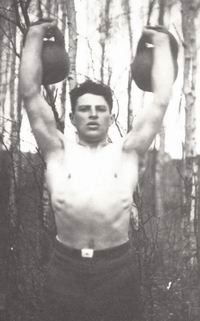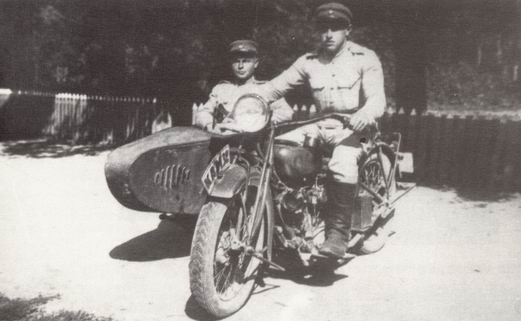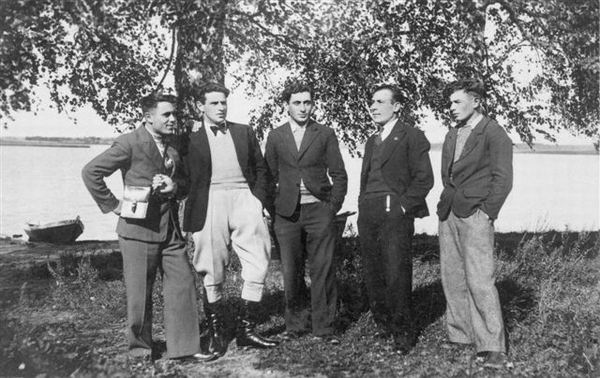[Pages 364-366]
Elke Baron, Hero of Dusiat
Translated by Yifaat Baron
|
Elke Baron, the shtetl hero, out of his own resourcefulness, flew from the slaughter inferno. During three years, he hid in the forests, cooperating with the partisans, but on the brink of freedom he drowned in a lake, armed with weaponry in order to take revenge!
The respectful gentiles told the story of his heroism to the survivors who returned to the shtetl.
Shayke Glick: Elke used to tie two sacks of sugar with rope and easily carry them – two sacks on each shoulder.
Zelig Yoffe: And in one gulp he would swallow twelve jugs of beer.
|
|
|
|
Elke (Eliyahu) Baron
|
Elke Baron in Lithuanian army uniform
Zelig Yoffe tells the story:
With Lithuania's annexation to Russia, Elke was sent by the Russians to Zarasai to learn agriculture and driving a tractor. As WW2 broke out, Elke arrived at the town riding on a tractor. Hearing the engine's clatter, the Shaulists[1] thought a tank was invading the town and went towards the sound…
On the day the Dusiater were lead to their death, Elke managed to flee the death inferno, and half naked, crossed the lake and hid in the forest, in a hole. Occasionally, he secretly made the ten-kilometer distance to a gentile friend, a fisherman who provided him with food.
Two Russians, who were with me in the Lithuanian Division[2], told me they had been in contact with the partisans. During their wandering, they came near to Dusiat. They were looking in the forest for a place to hide and suddenly they saw a light emitting from the ground. Hearing their calls, a man peeked out of the hole, bent on his knees. He had a beard that reached his knees and part of his body was naked… It was Elke Baron. He recognized them and invited them into his “house”. In the hole they found preserves and potatoes – food that lasted them for two months.
Elke contacted the partisans, and it was said, that he always volunteered for various assignments and called for revenge. But the gentiles were forced to hold him back. “Be patient,” they told him.
One day they were waiting for a contact. Time went by and the messenger failed to arrive. His friends were very tense but Elke calmed them down. Suddenly, a cry was heard, “Save yourselves!”… As it turned out, fascists had followed the messenger, and thus, the hiding place was exposed. The gentiles, who were dressed, came out of the hole and started shooting. Elke, who didn't have the time to get dressed, slipped away, and naked, he crossed the lake.
The two gentiles told me they had faith that they would meet him again. They looked for him in the forest and hoped that at night, the smell of fire would lead them to him. A while went by and that is exactly what happened. They found Elke in “Ilgishiler Wald” (forest).
They also told me how they went with Elke to look for food. Once they accompanied him to Pasonienia who lived with her husband near the forest. They entered the house and the husband asked, “How much do you need?” and Elke answered, “We tend to tell the others how much we need but you can give us as much as you like…”
About the last night of his life, I was told, that Elke and two of his friends heard that the Russians were getting closer to the vicinity. They armed themselves and were supposed to cross the lake by boat. Elke offered to transport the weapons on his own, but his friends disagreed. Elke and one of the friends got into the boat with the weapons and ammunition, while the other remained on the shore and waited, but the boat did not return.
Later, Elke's body emerged from the water. In the pocket of his shirt, a photo of his sister was found…
Baruch Krut: Elke and his brother Gershke sneaked away from the murderers. Gershke was shot, but Elke managed to escape. He crossed the lake and arrived naked to Gramalis the Russian, who lived in a village located in a forest, twelve kilometers away from Antazova.
Gramalis was a rich man, and before the war broke out, he had commercial connections with the Baron family. For a while Elke hid in Gramalis' yard, but the fascist came and threatened to set the place afire if Elke was found there. Elke left for the forest, and there he hid in a hole. Two other Russian communists from the village Uzalina whom I met after the war, hid with him. They told me that Elke told them that if he managed to survive the war, he would have a living for his whole life, since he knew where the Jews had hidden their gold…
About his last night, I was told, that at Markailis' house, Elke and a few others were listening to the radio. They armed themselves with weapons in order to transport them to the forest on the other side of the lake. A few rifles and ammunition were tied to Elke's body, underneath his clothing. While they were in the boat, a strong wind blew and the boat overturned, its two sailors left to drown.
I think Elke did not manage to free the weapons from his body, and because of their weight, he drowned. Otherwise, he would probably have survived. After all, he was a great swimmer, and a hero!
His body drifted ashore, and I was told the Fascist Lithuanians celebrated his death. They refused to show me his burial place.
Shayke Glick: I was told that as the Jews were led to the ghetto, Elke sprung under a bridge and hid. Later he stole away to Jashkinishok forest. From there, he collaborated with the partisans, most of them Russian and only a few Lithuanian communists.
Leib Slovo: … and I was told, that Elke begged his sister Mirke to come and run away with him, but Mirke answered: “Wherever everyone goes, we'll go too…”
Chana Fisherman: Elke found a hiding place in the town of Kalbutishuk, where many of its inhabitants were Russians who had been there from before the First World War. They were fishermen, and there were good relations between them and the Barons, who made a living from fishing and agriculture. All of them were strong and healthy. The Barons had especially good relations with the Russians who were despised by the local Lithuanians.
Malka Gilinsky: Elke and his family, who were fishermen, enjoyed exceptional relations with the gentile fishermen. Thanks to these relations, he managed to hide.
Of the last night, I was told, that Elke and his friends got drunk, and maybe for this reason they had trouble controlling the boat. But there are others who dared to say that they purposefully let him drown, since Elke knew details of the identities of the Lithuanian murderers…
|
|
“As an everlasting memoir for my brother Micha from your brother Eliyahu, December 19, 1935”
From right to left: Chaim-Hirshke Fein, Issar Levitt, Dovidke Zack, Eliyahu-Elke Baron, Micha Slep
None of them survived the Holocaust
|
Micha Baron: … and these are the things inscribed in my memory from a story I heard from one of the survivors:
My brother Elke ran away, and after seven hours of swimming he found a hiding place in the forest. Suddenly he heard the leaves rustling. He hid behind a tree, and made out the image of a man with a rifle. As the man walked by, Elke grabbed him, and as his hand went for his throat, the rifle fell from the man's hands. Elke bent down and took the rifle. All this time, neither of them had uttered a sound. Now, with the rifle in his hands, Elke threatened the man and asked who he was. The man recognized the voice at once. It was Olimpa, a Russian from Uzalina. I remember him as a tall man, handsome and healthy. Olimpa was also on the run from the Lithuanians as well as the Germans. He had a sack with food, and later they were joined by another Russian and two Jews from Abel (Obeliai).
Elke contacted his Lithuanian friend, the farmer Bilionis who ran the dairy. He supplied Elke and his friends with arms and food. Bilionis was a known Shaulist, and no one suspected he had contact with the communists. One night, Elke and his friends heard that the Russian front was making progress. Supposedly they expressed their joy by drinking. After that they crossed the lake in a boat but the boat was found empty…
Sara Weiss: In 1992, the son of the teacher Kuzmickas pointed out to me the spot on the shores of the lake where Elke's body was found. One of the locals said that Elke was buried in the Jewish Cemetery in Dusiat.
Footnotes
- The Shaulists were members of the Sauliu Sajunga – Lithuanian National Sharpshooters Association. At first they comprised paramilitary (civilian fighters) who fought for Lithuanian independence. Over time they become anti-Semitic extremists, and during the Nazi occupation they played an instrumental role in the annihilation of Lithuanian Jewry. Return
- “The Sixteenth Lithuanian National Rifle Division of the Red Army“ (in short, “The Lithuanian Division“) comprised mostly of Lithuanian Jewish soldiers. Return
This material is made available by JewishGen, Inc.
and the Yizkor Book Project for the purpose of
fulfilling our
mission of disseminating information about the Holocaust and
destroyed Jewish communities.
This material may not be copied,
sold or bartered without JewishGen, Inc.'s permission. Rights may be
reserved by the copyright holder.
JewishGen, Inc. makes no representations regarding the accuracy of
the translation. The reader may wish to refer to the original material
for verification.
JewishGen is not responsible for inaccuracies or omissions in the original work and cannot rewrite or edit the text to correct inaccuracies and/or omissions.
Our mission is to produce a translation of the original work and we cannot verify the accuracy of statements or alter facts cited.
 Dusetos, Lithuania
Dusetos, Lithuania
 Yizkor Book Project
Yizkor Book Project
 JewishGen Home Page
JewishGen Home Page
Yizkor Book Director, Lance Ackerfeld
This web page created by Lance Ackerfeld
Copyright © 1999-2024 by JewishGen, Inc.
Updated 25 Nov 2009 by LA





